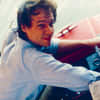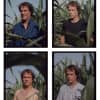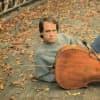In FADER 56, to celebrate the release of Wild Combination we caught up with Tom Lee, who told us about his life with his longtime partner, the late Arthur Russell. Now we have more of that exclusive interview, where Lee talks about meeting the parents, what it takes to make him feel cool, and meeting the love of his life. Click here to enter to win tickets to see Wild Combination tonight in San Francisco, and click below to read Simon Greenberg's interview with Tom Lee and see more photos.
When I first met Arthur I was living on Avenue A, right between 11th and 12th. I was new to New York, 28 years old. I spent a few weeks in the summer just kind of seeing him on the street. I was working at this job and I would come home from work and I would see him on St. Mark's Place. I didn't know how to approach him, and I had seen him out in a bar with some college friends and then I went back to that bar a few nights in a row, thinking, "maybe I'll see that guy again." It had to happen; I was going to meet him because I kept going back, and I wasn't going back for anyone else, you know?
What were you searching for?
I'm not sure, because to be honest with you I had a girlfriend in New Jersey. I kind of knew that I might be gay, but I didn't really; I had some flings with some guys but I would basically away from it. So I had these girlfriends. This particular one would come in on the weekends, but during the week I was like "there's that guy again." We started seeing each other and he started sleeping over because he had no phone or electricity. He was using my phone, he wasn't working – I would leave him money to go to Canal Street and buy cassettes. First it was $5, then it was $20. He was always like, "I need cassettes, I need cassettes," it was constant.
So he was running through insane amounts of cassettes?
He would buy them by the dozen in a box, and at the time I didn't know what he was doing with them because I wasn't that connected to his actual music making. He had his cello and his keyboards, and at then he would sprawl on the bedroom floor with spools of tape everywhere, even tape taped up to the walls. He was working on edits of "Is It All Over My Face." I just thought, "oh god this sounds horrible."
Really?!
Well, I pretty much loved him from the start, so it wasn't like "oh I don't like this guy because I don't like that music," but it just was so foreign to my ears.
So you weren't going out to discos at the time?
At the time I was this guy from New Jersey who listened to Joni Mitchell and Jackson Browne.
So when you would come home at night, would you listen to music or go out to see music?
Well, we'd go out to see groups. It was more like myself and my college friends might check out what was going on at CBGB or the Mudd club and with Arthur it was more connected to people he knew. One of our first dates was going to see the Talking Heads and the B-52s when they played in Central Park, and then there was an after party at the Mudd club. I was thrilled! I bragged to my friends, "oh I'm going to see the Talking Heads!" Even at the time it felt romantic, but in retrospect it was incredibly romantic. Walking home up lower Broadway at one in the morning, I would carry his cello. It was very sweet.
So was Arthur showing you into the "cooler" social circles at the time?
Kind of, but he was on the periphery. In terms of new wave bands, or going to clubs like Danceteria, someone like Ernie Brooks was just more concerned about that world.
The same way it always will be. There are the people who are concerned with being in the world, and then there's the people who make up the foundation.
Arthur was more like that. Ernie might say "oh you gotta see this band, they have this great guitar player." and Arthur would go. Whenever Arthur went out, he wasn't up front watching the band, he was kind of off to the side jotting things down on a piece of paper that had to do with his music. He wasn't mesmerized by too much music that was out there. We would definitely go to things – I mean that was our social life – but whenever he was working on something like “Schoolbell / Treehouse" or "Tell You Today" or "Go Bang" – there was this sort of journey to the club.
That's so strange to me. I imagined that he was going to discos and being influenced by it, but what it sounds like is that he was imagining what the disco was like and creating his own version of it. Is that fair to say?
Yeah. It wasn't like Arthur and I were in some gay disco world, getting dressed to go out to the club and dancing the night away. We’d go to CBGB, we'd go to Max's Kansas City, we'd go to Tier 3 but we'd listen to the group and then go home. For him it was about the daily grind of actually playing music.
And then around the house, would you be listening to records? Or was this more of his sanctuary for creating things?
Arthur would buy a lot of records at Sounds on St. Mark’s. He would buy pop albums like The Police, but really and truly he would listen to them three times. He would listen to a couple tracks, even if it was the hottest record of the moment, just listen, and whatever he stored in his mind, that was enough for him. With most of his own music, he wanted somebody to take the song and produce it, so he would listen to records to hear how other people produced their songs.
So it was more like reading a book, you get what you need to and file it away?
Definitely. I regret that I don't have his records any more, I sold them to some guy on St. Mark's. I remember that he loved Terry Riley. We saw Terry Riley a couple of times, and I have such a fond memory, because I knew it was important to him. It was rare that he would play me something; that was an interesting thing about Arthur. I always longed for the time when he would put something on the machine and say "listen to this, I like this." My memory of what he loved is slim. I remember "Tell You Today" was a record he really loved and was fun for him. "Let's Go Swimming" too. I can almost picture him giggling, like, "isn't this great?" There's this song called "More Real" and I always thought it was odd because it was something he really liked. "Platform Over the Ocean" – that was something he worked really really hard on. I feel like that was a song we worked on together, just because he would give me cassettes of it. I have a really nice memory of going out for a walk on a Saturday and coming back home and telling him "ok, here's what I like, let's try this." At the time you could do that because there was so much tape available.
So were you basically paying for his music at that time? The studio time?
That would vary depending on who you talked to. He had no income, and I had a steady 9-5 job that paid well, so I paid all the rent and utilities. For the first two years that I knew Arthur, I would pay for everything. Although I was still kind of warming to the fact of being gay – it was still a little secretive. So, we'd be together, we'd go out together, but we took it slowly. I also thought that this place was not a place I would ever live, and now I've lived here 27 years. Not to mention that all his equipment was everywhere – the living room, the bedroom – everywhere. When I first met him, he was doing more meditation, so he had this scrim and he had a platform he found on the street – a little meditation area. I would come in at the planned time and would find him meditating. That sort of ended at a certain time, though.
That's funny, people talk about his later music as being very meditative, but it sounds like you're saying that maybe it got more meditative as he abandoned actual meditation?
I think that could be true! I think he saw Buddhism and meditation as a way of being. He was very kind, one of those people who would never kill an insect. He was a meek person in many ways. We would have conversations about religion, and he always felt I was too knee-jerk about being anti. But I never learned from him that Buddhism wasn't trying to be religion. To him it was pretty personal. We spent 10 years living together, but he really held that inside himself. He had certain objects, fetishes – he always had a packet of scented dust that he kept in his pocket. He was obsessed with having pockets on his shirts. At one point he had his sister sew pockets on shirts that didn't have them so he would have a place to put his music notations. He always had folded pieces of paper in his pockets – phrases, notes, ideas for lyrics.
People definitely connect a lot to how direct his lyrics are – how he would take a simple phrase and intonate it so it connects to some almost innate part of you. The words are never in the place you would expect them to be, where you would expect things to happen is never where they happen. It gives people something to rediscover all the time.
The structure of his songs is incredibly atypical. I think I first really noticed that with "In the Light of the Miracle." It's kind of a story song that didn't tell a story. It suggests imagery, it suggests thoughts.
And it's even more poignant, especially considering his voice has a very familiar Americana sound to it. Do you feel like these very skeletal lullabies have contributed to this kind of enigma around his music?
Well, when I listen to other people's music, I try to think about those kinds of things. I'm so connected to Arthur's music, I can't really analyze it. There's something very difficult about Arthur's music.
Would he have liked to have a pop presence?
Well, World of Echo got some good press and he was very happy about that. I feel like that was the music that he felt was speaking to who he was. I don't think he wanted to ape what any popular artists were doing, but he saw approval as an ongoing process. He trusted other people – Will Sokolov, Nicky Siano – he wanted them to deliver the goods to the people who are going to then say "yes."
And what about all the names he would adopt for different projects? Tiger Stripes, Dinosaur, Loose Joints, etc?
I think he was trying to be undercover. I think he wanted people to have to figure out who Killer Whale was. It was kind of a light, whimsical thing for him. He was also beholden to the sounds of the day, using keyboards and drum sounds of that day, maybe that's why the songs sometimes don't sound timeless. I always think about "Wild Combination." That's just such a beautiful song, it's almost like it was already out there in the world. I do hope that it gets there someday.
I think he wrote prolifically in California, some of the songs are of his experiences in Iowa. Discovering these tapes that are going to be on Love is Overtaking You– they would just be on cassettes mixed up in boxes of things. I would bring them to my brothers in New Jersey. They had met Arthur a couple of times, and they didn't know too much about him – they didn't quite have a handle on something like "Is It All Over My Face." We'd play these songs in their cars and they would say "this is Arthur!?" because the sound was of the world already.
I hear some of the corny songs that people sing, like Jens Lekman. I mean, if Jens can do his songs, he seems like a very nice guy, but he's just loose and free, and just saying simple things coming from conversation – they're very experiential. I think Arthur's songs were also that way, like "Make One Two" is about making a phone call. He's just taking a phrase and repeating it, making it into a song, but the experience is very simple: "I want to call you." That's what I really like about his songs, that they are speaking about a particular feeling, a moment in time.
Have you spent a lot of time with Arthur's parents in Iowa?
Actually the only time I've been to Iowa is with Matt and the film crew [for Wild Combination]. so maybe the film is presenting something a little falsely there. But I think Matt is trying to establish a connection with the family, and that's what's important to the film.
Does spending time with the family feel comfortable to you?
If you have a partner who dies of AIDS, you don't necessarily have much connection with the family. For years I was just the guy who lived in the apartment with Arthur, so when he was sick, I became more important. But before he was sick, I was the guy who if his parents called and got me on the phone, they got more information. His dad would say, "So you know, what's Arthur doing with that song? Did he get that keyboard he was going to buy?" I think Arthur had to present to his parents that he was more on top of things than maybe he was. His father was actually funding a lot of his music – buying equipment, he had this thing he called C.A.M.E: "Charles Arthur's Music Enterprise." his parents were very supportive. At the beginning I thought they were totally estranged.
And how is it that you got into teaching?
When Arthur was sick I had a frame shop. I had an art background from college, but I was just kind of going nowhere. Arthur was sick, my partner in the frame shop got multiple sclerosis, and at the same time, my siblings were having children. There was a connection that I've always had with young kids – maybe it's because I’m just the gay uncle, but I don't know I just love them! One of the artists I used to frame for had a child, and her child was being cared for by someone at Bank Street College. She really triggered that interest in me. When I was 39, I went back to college.
It was a way to make a clean break. I was used to Arthur staying up late – he would have his headphones on and there would be this constant plunk plunk tapping of the keyboards, all plugged in. And after awhile I would be up in bed like "will you stop doing that? I can't get to sleep!" In many ways, it was like any other relationship. When you're in the midst of it and bickering over "you're late for dinner," you're not thinking this guy's going to go on to be an icon. You're thinking "you said you were going to be home at six. The rice is done!"


